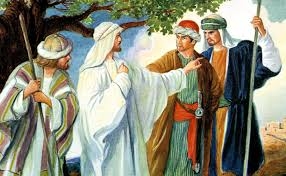1st day of Simbanggabi (December 16)

Gospel Reading
John 5:33-36
33You sent messengers to John, and he testified to the truth.
34Not that I accept such human testimony, but I say these things so that you may be saved. 35He was a burning and shining lamp, and you were willing to rejoice for a while in his light. 36But I have a testimony greater than John’s. The works that the Father has given me to complete, the very works that I am doing, testify on my behalf that the Father has sent me.
Reflection for the Homily
John the Witness of Jesus
In the narrative of the birth and ministry of Jesus, John the Baptist takes a very significant role. He represents Jesus, not only as a voice one who comes before the Lord to announce the coming of the messiah, but also is presented as the disciple par excellence of the Messiah. His preaching re-echoes that of Jesus, his very own form of living points to the very life of Jesus himself, his death foretells Jesus’s end. He is the first disciple and an example for those who will follow the Divine Master. From John the Baptist’s story one sees the very life of Jesus himself.
Jesus, in the gospel reading, bears testimony to the very life and mission of John the Baptist. He describes John as a “burning and shining lamp” (v. 35) from whom people rejoice for such a splendid life and bearing witness to the coming of the Messiah. Indeed John, in all gospel narratives, is a disciple beautiful to behold. He preached truth and justice, lived truthfully and justly, and died because of the same message of truth and justice of God. So too Jesus lived, preached and died for us all.
Jesus the Witness of God’s “Mystery of Mercy” (MV 2)
On this first day of the novena of our preparation for the celebration of the birth of Jesus our Savior and God, we contemplate this child as a revelation of the mystery of God’s mercy. Jesus’ miracles of healings simply reveal the mystery of God’s mercy. To the sinners, to the sick, the blind, and to all those who were called the dregs and outcasts of society, Jesus was the Father’s face of healing, wholeness, and reconciliation. To those in great need, Jesus was the messenger and message of God’s loving compassion. He gave back to them “joy, serenity and peace” (cf. MV. 2). The power and authority of Jesus to cast our demons from those possessed gave them the liberty and freedom to become sons and daughters of the Father once more—free to love, free to believe and free to proclaim God’s mysterious mercy.
Believers a Witness of God’s Mercy
As believers preparing to celebrate the birthday of Jesus, we are challenged by Pope Frances to be sacraments of the Father’s mercy and compassion. We are to be the face of God’s mercy for those in most need of God’s healing, kindness, and gentleness—“Mercy: the fundamental law that dwells in the heart of every person who looks sincerely into the eyes of his brothers and sisters on the path of life” (MV 2). Our relationships ought to bring peace, serenity, and joy to all, just as a child gives authentic joy and happiness to those whom the child shares its smile. Our presence ought to soothe tired souls and weary hearts, our touch aught to restore and build up trampled self-worth and destroyed self-image. Our words ought to heal broken hearts and wounded consciences. We are the supposed images of God’s mysterious mercy.
Fr. ‘der, oar
